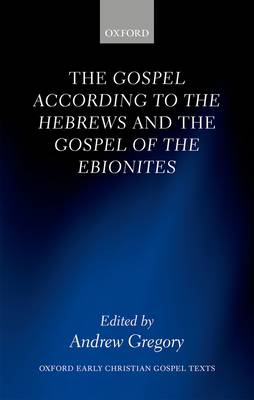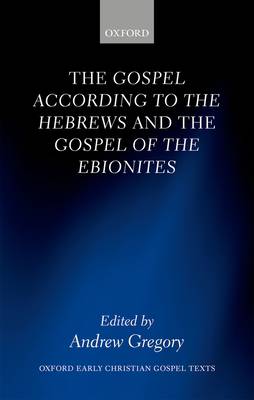
En raison d'une grêve chez bpost, votre commande pourrait être retardée. Vous avez besoin d’un livre rapidement ? Nos magasins vous accueillent à bras ouverts !
- Retrait gratuit dans votre magasin Club
- 7.000.000 titres dans notre catalogue
- Payer en toute sécurité
- Toujours un magasin près de chez vous
En raison de la grêve chez bpost, votre commande pourrait être retardée. Vous avez besoin d’un livre rapidement ? Nos magasins vous accueillent à bras ouverts !
- Retrait gratuit dans votre magasin Club
- 7.000.0000 titres dans notre catalogue
- Payer en toute sécurité
- Toujours un magasin près de chez vous
The Gospel According to the Hebrews and the Gospel of the Ebionites
264,45 €
+ 528 points
Description
Scholars are divided on the number of gospels to which fragmentary Jewish-Christian gospel traditions should be attributed. In this book Gregory attributes them to two gospels: the Gospel according to the Hebrews and the Gospel of the Ebionites, with no need for any postulated Gospel of the Nazoraeans. As two distinct texts, each gospel is treated on its own terms, with its own introduction, followed by a text, translation and commentary on each fragment, and further discussion about what we may conclude about the overall character of the text on the basis of the fragments that survive. Yet they share certain common features that warrant them being treated together in one volume with an introduction that discusses certain critical issues that are relevant to them both. One common factor is the partial and indirect way in which these texts have been preserved. No independent manuscript tradition survives for either text, so they have been transmitted only to the extent that they
were quoted or discussed by a number of early Christian authors, none of whom claims to be the author of the text from which he appears to quote or to which he appears to refer. This raises a number of questions of a literary nature about how excerpts from these texts may be interpreted. Another common factor is that these gospel traditions are usually referred to as Jewish-Christian, which may raise questions about their historical origins and theological outlook. Any judgment about the historical origins or theological nature of these gospels must rest upon prior examination of what may be reconstructed of their texts, and Gregory is careful to distinguish between what we may conclude from these gospels as texts and how they might contribute to our knowledge of early Christian history. The book also includes a number of appendices in which he discusses issues that have been prominent in the history of scholarship on these texts, but which he argues are not relevant to these two
gospels as he presents them. These include claims about an original Hebrew gospel of Matthew, the postulated Gospel of the Nazoraeans and the so-called 'Jewish gospel', as well as what may be known about the Nazoraeans and the Ebionites.
were quoted or discussed by a number of early Christian authors, none of whom claims to be the author of the text from which he appears to quote or to which he appears to refer. This raises a number of questions of a literary nature about how excerpts from these texts may be interpreted. Another common factor is that these gospel traditions are usually referred to as Jewish-Christian, which may raise questions about their historical origins and theological outlook. Any judgment about the historical origins or theological nature of these gospels must rest upon prior examination of what may be reconstructed of their texts, and Gregory is careful to distinguish between what we may conclude from these gospels as texts and how they might contribute to our knowledge of early Christian history. The book also includes a number of appendices in which he discusses issues that have been prominent in the history of scholarship on these texts, but which he argues are not relevant to these two
gospels as he presents them. These include claims about an original Hebrew gospel of Matthew, the postulated Gospel of the Nazoraeans and the so-called 'Jewish gospel', as well as what may be known about the Nazoraeans and the Ebionites.
Spécifications
Parties prenantes
- Editeur:
Contenu
- Nombre de pages :
- 342
- Langue:
- Anglais
- Collection :
Caractéristiques
- EAN:
- 9780199287864
- Date de parution :
- 16-05-17
- Format:
- Livre relié
- Format numérique:
- Genaaid
- Dimensions :
- 236 mm x 155 mm
- Poids :
- 657 g

Les avis
Nous publions uniquement les avis qui respectent les conditions requises. Consultez nos conditions pour les avis.





